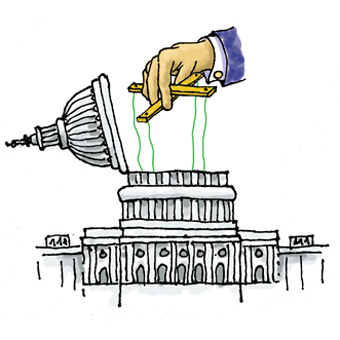The special interest groups pulling legislators’ strings can no longer hide in the shadows.
The shooting of 17-year-old Trayvon Martin in Sanford, Florida has focused national attention on the at times mortal perils faced by African American teens due to racial profiling. But the use of deadly force against a young man armed only with a bag of Skittles also inadvertently spotlighted an organization, the American Legislative Exchange Council (ALEC), that generally prefers to work in the background of U.S. politics.
Florida’s “Stand Your Ground” law and its lax standards for carrying concealed weapons may have played a substantial role in Martin’s death, and some of the credit for those Floridian peculiarities goes to the friendly sounding ALEC. Most people aren’t even aware of how this busy membership association of more than 2,000 state legislators (and 100 “alumni members” in Congress), with an annual war chest of $7 million and more than 300 corporate sponsors, influences their daily lives. The killing in Sanford has changed all of that.
In recent years the machinations of the rich and powerful—think energy barons and conservative sugar daddies like the Koch brothers—have become more broadly known, as citizen groups and the Occupy movement seek to flush out the nation’s true power brokers in Congress. In its attempts to influence public policy, ALEC takes a refreshingly direct approach: It simply writes the legislation it prefers and distributes it to sympathetic politicians to pawn off as their own.
ALEC is the CliffsNotes for influence peddlers. Thousands of ALEC-cribbed laws have been passed around the country; laws aimed at lowering corporate taxes, relieving businesses of obligations to clean up their environmental messes, and “truth in sentencing” laws that keep prisoners locked up longer and—not coincidentally—feed the prison construction and private corrections industries.
ALEC proudly describes itself as devoted to limited government, free markets, and federalism. Its interests, however, have strayed into odd corners of American culture. ALEC has been at the forefront of legislative efforts to stamp out what little is left of gun control and promote “show me your papers” immigration reform. ALEC also helped craft the legislation that turned Wisconsin into a modern labor war zone, and it is behind the dubious campaign against the fake problem of voter fraud.
The Catholic concept of subsidiarity—that social activities should be managed at the lowest competent level possible—is usually associated with restraining an over-defining role of government. But any social association that intrudes too forcefully on the common good and the vibrant expression of personal and community interests bears a critical review through the filter of subsidiarity.
ALEC’s corporate and legislative members meet annually to hash out legislative agendas far from the prying eyes and interests of the general public, a singularly undemocratic exercise in a nation that presumes a role for all citizens in defining and promoting the common good. Despite its presumed philosophical affinity for limitations on power, ALEC has become an overbearing authority in its own right—not participating in a public dialogue but circumventing and dictating it.
As ALEC’s efforts have become better known, pressure has been building on major corporations to disavow ALEC’s legislative agenda and withdraw from the organization. Many, including Pepsi, Coca-Cola, Kraft, and McDonald’s, have resigned from the group. ALEC’s executive director Ron Scheberle called this grassroots effort to neutralize ALEC’s influence an “intimidation campaign launched by a coalition of extreme liberal activists committed to silencing anyone who disagrees with their agenda,” a statement I presume he intends, considering his group’s efforts to disenfranchise low-income and Latino voters, as self-referential irony.
His outrage is not likely to persuade anyone to allow ALEC to slink back to the shadows. Sorry ALEC, we’ve seen the man behind the curtain, and he can’t hide there anymore.
This article appeared in the June 2012 issue of U.S. Catholic (Vol. 77, No. 6, page 39).
Image: Tom Wright













Add comment